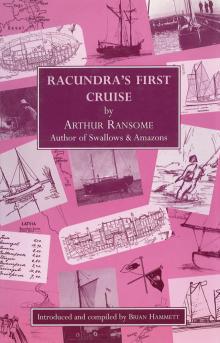- Home
- Arthur Ransome
Missee Lee: The Swallows and Amazons in the China Seas Page 3
Missee Lee: The Swallows and Amazons in the China Seas Read online
Page 3
THE BURNING OF THE WILD CAT
Crrrr … ash!
Down came the foremast and the Wild Cat, crackling and roaring, lay a flaming, mastless wreck, reflected on the mirror of that oily sea.
“Better get well clear of her,” said Captain Flint. “I’m not sure both the big tanks have gone.”
“Can’t we do anything to save her?” said Nancy.
“Not a thing,” said her Uncle. “She’ll burn to the waterline and that’ll be the end of her. Poor old girl. She’ll go to the bottom or break up. Well, we’ve had some fun with her. Pity we couldn’t have taken her right round the world and let her end her days at home.”
“There are towels with the sleeping-bags,” called Susan.
“Drying fast,” said Captain Flint. “Salt water, anyhow. And warm. I’ll be all right. Thank you, Susan, all the same.”
“What do we do now?” asked Nancy, and the whole crew of the Swallow strained their ears to hear what he would say.
“Sit tight if we can,” said Captain Flint. “We know exactly where we are and that is plumb in the track of steamers. We’ve only got to sit tight and we’ll be picked up before this time tomorrow. Land’s not so very far away, but the China coast’s a queer one. No good landing just anywhere. It’s got to be a treaty port or nowhere. Much better wait here to be picked up. We’ve got a week’s water in each boat, more if we go slow on it. We’ve got grub. And best of all, we’ve got a calm. The only thing we haven’t got is a barometer. …”
“I’ve got one,” called John. “Susan saved it.”
“Good for you,” said Captain Flint. “Dig it out. It’ll give us plenty of warning if we have to change our plans.”
“Get it out of the box, Titty,” said John.
“When did you set it last?” asked Titty as she handed it over.
“This morning,” said John. “Gosh! It must have had a bump or something. I say, Captain Flint, I’ve got the barometer, but something’s happened to it. It’s gone down half an inch since breakfast. …”
“Are you sure? Give it a gentle tap.”
“Still going down,” said John.
Captain Flint looked round the horizon. “All right, so long as we keep together,” he said at last. “Dash it, I wish we had one big boat instead of two little ones.”
“More fun with a fleet,” said Nancy.
“John,” called Captain Flint. “Have a look at your sea-anchor. Make sure it’s all ready to put over the bows. And don’t spare chafing gear where the rope works over the stem. Use anything you’ve got rather than let it chafe through.”
“Aye-aye, sir,” said John seriously.
“May be a dirty night,” said Captain Flint.
“There’s a hurricane lantern in each boat,” called Susan. “I trimmed the wicks the day before we left port.”
“Good for you, Susan. We’ll put the sea-anchors over if there’s a breeze, and, with the lanterns burning, we ought to be able to keep in touch. …”
“What do we do if we get separated?” asked John.
“Best we can,” said Captain Flint. “Best of all if we can stay here till we get picked up.”
*
Side by side the little boats floated, while the crew of the Wild Cat watched and listened to the burning of the old schooner. Three parts round the world they had sailed in her. She had become almost part of themselves. At the beginning Captain Flint had had a paid hand to help him, but for a long time he had found that with the six of them he needed no one else. And now she was going. And there they were afloat in the two dinghies watching her burn.
They had had no time to be frightened. There had been too much to do. Even now, when they could do no more and lay there with the crackling roar of the burning vessel in their ears, their minds were more on the new life that was beginning than on the old that had come to so melancholy an end. If she had caught fire in an English harbour, it would have seemed the end of everything. But here it was not the end. They had still to get home and home was many thousand miles away. This was not the end and they were thinking not of days gone by or of days to come but of what they had to do that very night. “If you’ve got a burn on your hand, don’t lick it, Roger,” said Susan. “I’ve got some tannic jelly in the first-aid box.”
“Gibber’s scorched too,” said Roger, “and John,” and for a minute or two Susan was busy with the cooling jelly.
“Anybody burnt in your boat?” she sang out.
“Nothing to matter,” Peggy answered. “Only clothes, not skin.”
Captain Flint looked up from Amazon’s bows, where he was overhauling the sea-anchor, and saw Susan holding Gibber’s hand and putting jelly on his arm. He laughed.
“Don’t laugh at him,” said Roger. “He’s had a lot of hair burnt off.”
“He’s a good, clever monkey,” said Captain Flint consolingly.
“Almost too clever,” said Nancy, looking at the burning schooner.
“There’s the beginning of a swell,” said John suddenly.
“From the south-east,” said Captain Flint. “Wind coming. Better than a westerly, anyhow.”
For a moment there was silence, except for the crackling of burning wood. Then the crew of the Swallow heard Peggy say, “You do think we’re all right, don’t you, Uncle Jim?” They heard Captain Flint reply, “Right as rain, of course. Right as rain.”
“Not quite,” said Roger quietly. “Rain might have put the fire out and saved the Wild Cat.”
They were all looking at her. The sun was dipping now below the sea in the west and the sudden dark of the tropics was sweeping up out of the east. The Wild Cat flamed against the dusk like a row of torches.
“Two sunsets at once,” said Titty.
“The real sun’s gone now,” said Roger.
“Here comes the wind,” said John.
They all felt it, a faint breath out of the south-east. Already they were lifting and falling on a smooth swell. A line of ripples swept towards the sunset. There was a new noise of hissing from the burning ship.
“Water on the fire,” said Captain Flint gravely. “Burnt to the waterline, and now this bit of swell. …”
And suddenly, as he spoke, the burning stern of the Wild Cat lifted from the sea. Her bowsprit quenched its flames as it plunged. There was a long drawn hiss as the sea swept through her and the last flame went out as the little schooner disappeared for ever.
John, Susan and Roger heard Titty’s gasping sob and hoped it had not been noticed by the others.
Captain Flint spoke.
“She was a good ship,” he said … and then, in an altogether different voice, “more wind coming. Put the sea-anchor out while it’s light enough to be sure the rope’s not chafing. Get your lantern lit. Have something to eat now. Go very easy on the water. If it blows really hard, keep right down in the bottom of the boat. …”
CHAPTER III
WHAT HAPPENED TO SWALLOW
“I’M opening the grub-box,” said Susan.
“Good,” said Roger.
“Right,” said John.
Looking across to the Amazon, they could see, as she lifted and fell, that Nancy and Peggy were busy in the stern, while Captain Flint, paddling gently, like John in Swallow, was keeping her head to wind.
“Digging out their grub too,” said Roger. “I say, Susan. We’ve got plenty of biscuits, anyway. Are those ‘Thin Captains’?”
“Yes,” said Susan. “Two tins of them. … Four of condensed milk. … One tin of butter. … Eight tins of pemmican. … And a lot of dates. Chocolate. …”
“Amazon, ahoy!” shouted Roger.
“Swallow, ahoy!”
“What’s your cook got in her box? ‘Thin Captains,’ we’ve got, and butter, lots of pemmican, dates, chocolate …”
“Sardines,” said Susan.
“Sardines,” shouted Roger.
“We’ve got just the same,” called Peggy.
“Hullo, Roger,” called Nancy. “Captain
Flint says we may have to make things spin out. So you’re not to start hogging everything just to see what it’s like.”
“As if I wanted to,” said Roger. “I only wanted to make sure we’d all got plenty of everything.”
“Half a mug of water’s the ration tonight,” Captain Flint called out.
“Aye-aye, sir,” called Susan.
“When do you think we’ll get home now?” asked Titty.
“If we get picked up by a liner going the right way,” said John, “we’ll be home much sooner than if we were sailing in the Wild Cat.”
“We don’t want to do that,” said Roger.
“When do you think there’ll be a steamer?” said Titty. “We ought to let Mother know we’re all right. …”
“Four biscuits each,” said Susan. … “Two sardines … eight dates … and half a mug of water. We’ll take turns with the mug. And we’d better put off drinking till we really want it.”
Dark in the tropics comes down like the fall of a curtain. There was already much more wind.
“Putting our sea-anchor over now,” shouted Captain Flint. “There’s enough wind to keep us clear of it. … You’d better do the same.”
“Aye-aye, sir.”
HOW A SEA-ANCHOR WORKS
John dropped his sea-anchor over the bows and paid out its long warp. It was a conical bag of canvas with a hole at the pointed end. A bag of that shape, pulled wide end first through the water, keeps a boat from drifting too fast. Paid out over Swallow’s bows it kept her head to wind. There was no need now to use the oars. John stowed them, wrapped the rope in a towel where it crossed the gunwale (Susan had to agree that it was better to use a towel than a sleeping-bag) and settled down with the others to their first shipwrecked supper.
A light flickered over the waves.
“They’ve lit their lantern,” said John.
“Ours is all ready,” said Susan, lighting it as she spoke.
“It’s blowing a lot harder,” said John half an hour later.
“Ahoy, there! How’s your anchor warp streaming?”
John peered over the bows and pulled at the warp while Susan held up the lantern behind him.
“Straight ahead and pulling hard. I can’t get it in an inch.”
“That’s all right. How’s the barometer?”
There was a pause.
“Gone down another two-tenths, sir. But it jerked up a bit when I tapped it.”
“That means whatever’s coming won’t last long. But it may be tough while it’s with us. Better get some sleep if you can.”
“I’ll keep watch,” said Susan.
“No need,” said John.
“We don’t want to sleep,” said Roger.
“Good night. … GOOD NIGHT.” A shout came through the darkness.
“Listen. They’re going to sleep in Amazon.”
“GOOD NIGHT!” the Swallows shouted back.
“Let’s have that lantern, Susan,” said John. “They must have fixed theirs on the middle thwart in case of splashes. I’ll do the same. Bother the mast and sail. …”
“They won’t matter when we’re down on the bottomboards,” said Susan. “All right, Roger. Gibber’ll go in his sleeping-bag. You push him in. Lie right down, Titty. …”
“It’s Polly’s cage in the way,” said Titty.
“Put it bang in the middle,” said John. “Susan and I’ll manage all right.”
“Go to sleep.”
And, after what they had gone through that day, go to sleep they did, Roger and Gibber, Titty and Polly, Susan and, at last, John himself, who had made up his mind to stay awake to watch that flickering lantern in the other boat.
*
John was waked by a splash of warm water on his face and the taste of brine in his mouth. For one second he was puzzled. Then he felt for the hurricane lantern, which had been blown or shaken out. He looked round in the darkness to find Amazon’s lantern, but could see nothing at all. There was a fierce wind in his face when he lifted his head above the gunwale. There was a sea running too. Swallow was pitching and tossing as each wave lifted her up, passed under her and dropped her. There was another splash. She could not be heading as straight to windward as she had been. John reached forward and felt the warp over the bows. Yes, it was still there, wrapped in the towel. He reached further forward, took a grip of the rope and pulled, never thinking for a moment that he would not find it bar-taut. He gave it a hard tug and felt it yield to him. Yet the wind was much stronger than it had been. He pulled again and found that inch by inch he was able to haul in. Better have a look at that sea-anchor. Presently the rope began to come in more and more easily and then, as if to warn John that he was doing wrong, a wave hit Swallow broadside on, splashed over the gunwale, woke everybody and set the parrot screaming in the dark.
“John!” called Roger.
“What’s happening?” said Susan.
“My fault,” said John. “The sea-anchor’s gone. There’s only the rope holding her to windward, and I’ve been hauling in without thinking. I’m letting it out again. She’ll be all right in a minute. The rope must have gone at the sea-anchor. This end’s all right.”
He paid out the rope he had hauled in. There was enough pull on it to keep Swallow heading up to windward and there were no more serious splashes.
“She’s probably moving,” said John. “She may be moving pretty fast. The rope by itself’ll stop her a bit but not much.”
“Is it all right?” asked Roger.
“All right as long as people keep still.”
“Polly must have got wet,” said Titty.
“Where’s Amazon?” asked Susan.
“Lantern’s gone out like ours,” said John. “And with that anchor going we aren’t anywhere near her.”
“Can’t we row back?”
“Couldn’t row against this,” said John. “And we might miss them if we could.” John was shouting to make himself heard. “Look for them when it’s light. It won’t blow like this for long. We’ll be all right if we keep down in the boat. … Down in the boat. … Captain Flint SAID SO.”
“There’s a lot of water in her,” said Titty.
“WHAT?”
“SHE WANTS BALING.”
“BALE BUT DON’T GET UP. BETTER WET THAN DROWNED.” That was what Daddy would have said, and John, having said it, felt better himself. It was almost like having Daddy in the boat.
“Warm water, anyhow,” said Susan.
John thought hard. Was there a single other thing he could do? There was not. He thought for a moment of putting the sail and spars overboard and tying them at the end of a rope. He decided against that. If the rope broke again, the sail would be lost, and they might come to need it badly. If only he had had any idea how fast they were moving and how long it was since the sea-anchor went. Titty and Roger could bale a bit to keep them quiet. He would start baling himself if much more water came in. Gosh! What about Amazon with her leaky centreboard case? They would be doing some baling there. Saying nothing to the others he kept on looking round for the glimmer of her lantern, though he was pretty certain now that she was many miles away. He tried to light the lantern, but it blew out again at once. He gave it up and flashed his torch on the barometer. It was going up. That was something. He flashed his torch on his compass. They were heading south-east. That meant, as they were driving stern first, that they were going north-west. But of course there might be a current of some sort.
“Which way are we going?” shouted Titty. “She isn’t very wet now. Only a little slosh about my ankles.”
“North-west,” said John. “China. We’ll hit the coast somewhere if we go far enough.”
“Missee Lee,” said Titty. “Pirates.”
“So long as we get ashore,” said Susan, “we’ll be all right. But what’ll the others do if they don’t know where we are?”
“They’ll get picked up by a liner,” said John. “And then they’ll come and look for us. Captain Flint�
��ll guess what’s happened.”
“But if he doesn’t?” said Roger.
“Ration of chocolate,” said Susan hurriedly.
*
That night seemed to last for ever. Hour after hour they drove on in the dark, stern first, the little Swallow lurching up over each sea and diving down into the following trough. Susan and John between them used up half a box of matches trying to relight the lantern and then gave up. From time to time John flashed his torch on the compass and saw that they were still being driven towards the coast. The rope trailing from the bows kept them head to the wind more or less, but splashes came aboard from time to time. The strong wind blew the words from their mouths, so that they could only make themselves heard by shouting into each other’s ears. But they soon gave up even trying to talk. Titty did her best to shield the parrot. The whimpering Gibber, bundled into his sleeping-bag, lay in Roger’s arms. Hour after hour they huddled in the bottom of the boat, bumping against each other as she lurched, bumping so often that the bumps did not even keep them awake. Tired out, they dozed, waked, baled and dozed again in the darkness and the wind.
*
The wind dropped suddenly, so suddenly that it was like coming indoors out of a gale. The sea eased. For the first time for hours they felt that they could move without the fear of being flung out next moment into raging water.
“Is it over?” said Titty.
“Pieces of eight!” screamed the parrot.
“Has he been talking for a long time?” asked Roger.
“We wouldn’t have heard him before,” said Susan. “You didn’t hear me when I was fairly shouting at you.”
“Shut up a minute,” said John. “Listen!”
“What is it?”
“Listen!… Breakers. … Over there… I thought I heard them before. …”
They listened. Yes, there could be no mistaking the dim, swaying roar of waves breaking on the shore.

 Peter Duck: A Treasure Hunt in the Caribbees
Peter Duck: A Treasure Hunt in the Caribbees Racundra's First Cruise
Racundra's First Cruise Great Northern?
Great Northern? Swallowdale
Swallowdale Swallows and Amazons
Swallows and Amazons Winter Holiday
Winter Holiday Missee Lee: The Swallows and Amazons in the China Seas
Missee Lee: The Swallows and Amazons in the China Seas Pigeon Post
Pigeon Post We Didn't Mean to Go to Sea
We Didn't Mean to Go to Sea The Firebird and Other Russian Fairy Tales
The Firebird and Other Russian Fairy Tales Coot Club
Coot Club The Big Six: A Novel
The Big Six: A Novel Six Weeks in Russia, 1919
Six Weeks in Russia, 1919 Secret Water
Secret Water The Big Six
The Big Six Missee Lee
Missee Lee Peter Duck
Peter Duck The Picts and the Martyrs
The Picts and the Martyrs